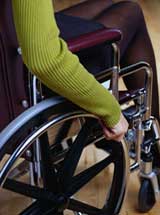Coming and Going Rule
by Joyce E. Davis, Esquire
These materials have been prepared by the Law Office of Joyce E. Davis for informational purposes only. They are not meant to be and should not be construed as specific legal advice. For assistance with a particular legal question, please consult a licensed attorney.
Copyright (c) 2002 Joyce E. Davis
All Rights Reserved
an employee who . . . receives a personal injury arising out of and in the course of his employment, or arising out of an ordinary risk of the street while actually engaged, with his employer's authorization, in the business affairs or undertakings of his employer.
Who Paid For The Travel?
Where an employee works outside the employee's premises, the Reviewing Board has focused on two factors to determine whether the “coming and going rule” should apply: 1) whether the employee was being paid at the time of the accident and 2) whether the employee was reimbursed for the cost of travel between her home and place of employment. Dow v. Intercity Homemaker Service, Inc., 3 Mass. Workers' Comp. Rep. 136 (1989). For example, in Dow, the employee went directly to the homes of the clients assigned to her and she was paid a travel allowance of $2.50 per week. This was intended to equal one half of the cost of public transportation from her home to her first stop and one half of the fare home from her last stop of the day. In the eyes of the Reviewing Board, it was this travel allowance that rendered the employee's injury compensable.
The decision stated:
The fundamental question facing the fact finder in the case at hand was this. Did the travel payment convert the employee's journey from her home to the home of her first client into part of her employment, or was she merely paid a transportation allowance which was nothing more than small, added compensation? The evidence supports the result reached by the single member that the employer, by paying travel expenses, impliedly agreed that the employment relationship began when the employee set foot on the public way heading toward her first call of the day.
Id. at 139, emphasis added.
On the other hand, in Isokungos v. Seppela Aho Construction, 2 Mass. Workers' Comp. Rep. 154 (1988), the Reviewing Board denied benefits to an employee who traveled about forty-five miles each way to a fixed construction job site even though his employer paid a stipend for travel expenses when the work site was more than forty miles from home. The deciding factor in that case, which distinguished it from Dow, was the fact that there was a fixed place of employment.
Had the employee been injured in the employer's store, she would be entitled to weekly compensation. Had she been injured in a parking lot or garage, owned or in control of the employer, she would also be so entitled, although the injury occurred prior to the working day and prior to entering the store area. Had the employ[er] mandated parking in the Kerwin Garage as a condition of employment, she would be entitled to compensation. However, the evidence does not indicate, nor warrant, a finding that the employee could have deemed a requirement to exist as to mandatory parking in a specific location when only a limited number of her fellow employees parked at the Kerwin Garage and they, including the employee, alternated, each month, in picking up the monthly stickers.
Id. at 269-270.
